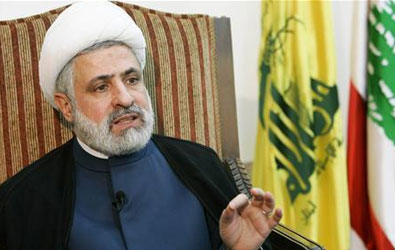
RNA – Speaking to a group of Lebanese graduates in Beirut, Shaykh Na’im Qassem, the Deputy Secretary-General of Hezbollah, said that considering the current political situation in the Middle East and in Lebanon itself, which includes several serious security and political crises, Lebanon enjoys security and political stability.
His Eminence added that political analysts who monitor and study the situation in the region, have reached an impasse and consider it almost a miracle that Lebanon is not involved in the conflict and problems facing the region.
The Lebanese Shi’a cleric said that the continued security in Lebanon is in the interest of both Lebanon and the other countries in the region, and added: “Unfortunately, politicians obstruct the establishment of [further] security which are in the public’s interest and opportunities and potential to develop the country are being wasted.”
In regard to the issue of whether Lebanon is better organized with a president or with the current turbulent political structure where the office of president is vacant, Shaykh Qassem stressed that Hezbollah wants government officials who do not waste the opportunities which will lead the country to prosperity.
The assistant to Sayyid Hasan Nasrallah said corruption in the political, social and legal arenas in the country are the result of significant deviation in regard to policies and sectarianism which has led the country away from the correct path over the years. “Political corruption when coupled with sectarianism adds to the depth of the deviation and corruption facing Lebanon,” he said.
Shaykh Qassem said that the current electoral laws and corrupt politicians in the country reinforce corruption and added that if necessary changes are not made in the laws, the corruption which pervades this tiny yet religiously and politically divided country cannot be legally dealt with and solved.
The Lebanese constitution outlines a unique power-sharing system in which the top governmental positions each belong to a particular ethnic-religion group in the country. The president must be a Christian, the prime minister a Sunni Muslim and the parliament speaker a Shi’a Muslim.
Lebanon has been without a leader since May 2014, when former President Michel Sleiman left office at the end of his tenure and the parliament is still unable to choose a successor to him.
There are sharp differences between rival parties over how to resolve the protracted political crisis that has plunged Lebanon into a presidential vacuum and paralyzed the executive and legislative branches of power.
111/112